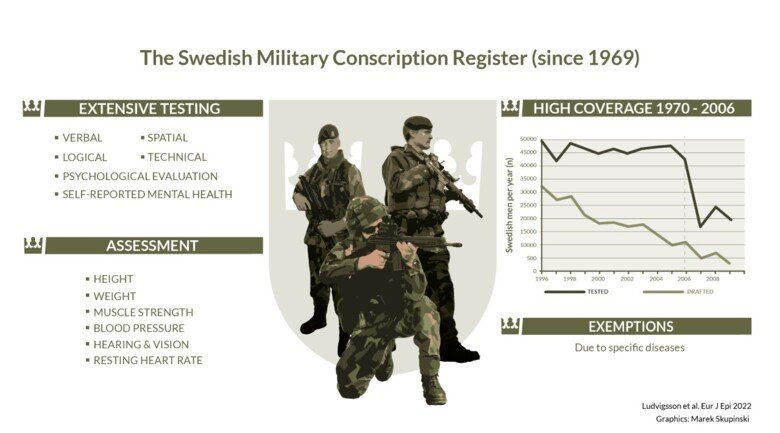Review paper about the Swedish Military Conscription Register

The Swedish Military Conscription Register contains data on some 2 million individuals. Conscripts underwent extensive testing, data that can be used in epidemiological research. Now researchers from Karolinska Institutet, Uppsala University and Lund University publish a review about the register in the European Journal of Epidemiology.
Most Swedish conscripts were born between 1951 and 1988 and tested 1969-2006. For this cohort, the register has a population coverage of about 90% for men.
Conscripts underwent written tests focusing on verbal, spatial, logical and technical ability, but also medical, physical, and psychological testing. The assessment included hearing, vision, muscle strength and exercise capacity, height, weight, blood pressure and resting heart rate.
“The conscription register has been widely used to study, e.g., obesity, cardiovascular disease, mental health, crime, cardiovascular fitness, muscle strength, sick leave and disability pension”, says first author of the paper, Professor Jonas F Ludvigsson, pediatrician at Örebro University Hospital and professor at the Department of Medical Epidemiology and Biostatistics, Karolinska Institutet.
Between 1990 and 2018, about 25,000 women also volunteered for testing, but almost 99% of all individuals in the register are men. Of note, the coverage after 2006 is low also in men.
“One of the main contributions of our paper is to clarify when the Swedish Military Conscription Register, or in Swedish “Värnpliktsregistret”, is valid to use, and our data show that is for the time period 1970-2006” adds Ludvigsson.
During the 1970s, 1980s, 1990s and early 2000s, Swedish men were asked a range of questions including questions on sleeping habits, personality, and frequency of physical exercise.
“The conscription register contains unique data for a very high proportion of Swedish young men”, says Professor Martin Neovius, professor at the Department of Medicine (Solna), Karolinska Institutet, and corresponding author. He continues: “Not least do we have valid data on height and weight.”
But while the conscription register is a gold mine for research, particularly in young men, the register has some inherent limitations.
“Individuals with certain diseases were exempted from military service. Hence the register underestimates the true prevalence of certain diseases, and those with any such diseases and registered in the conscription register may have a milder version of the disease in question.” tells Neovius.
Dr Ludvigsson has coordinated a study on behalf of the Swedish IBD quality register (SWIBREG). That study received funding from the Janssen corporation. Dr Sundström reports stock ownership in companies providing services to Itrim, Amgen, Janssen, Novo Nordisk, Eli Lilly, Boehringer, Bayer, Pfizer and AstraZeneca, outside the submitted work. Dr Neovius reports advisory board participation for Ethicon, Johnson & Johnson and Itrim, and consultancy for the Armed Forces outside the submitted work.
Publication
The Swedish Military Conscription Register: Opportunities for Its Use in Medical Research. Jonas F. Ludvigsson, Daniel Berglind, Kristina Sundquist, Johan Sundström, Per Tynelius, Martin Neovius. Eur J Epidemiol, online July 9 2022, DOI: 10.1007/s10654-022-00887-0.
